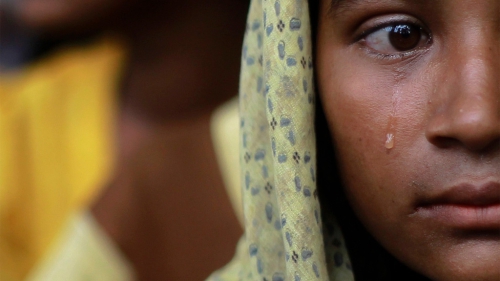Quran strikes out wife beating

The following verse is often misunderstood or misused by both Muslims and non-Muslims. Yahya Emerick gives a detailed background and explanation of this verse in his translation and commentary of the Quran titled, "The Meaning of the Holy Qur'an in Today's English."
Men are (qawwamun) responsible,1 for the welfare of women since God has given some (of you) more (faddala) wherewithal 2 than others, and because they must spend of their wealth (to maintain the family). Therefore, pious and devout women safeguard the private matters that God would have them (hafitha) safeguard. 3 As for those (women) from whom you fear (nushoozahunna root nushooz) aggressive defiance, 4 caution them (to piety). (If they remain unmoved by your words), then leave them alone in their beds, and finally, (if they continue in their aggressive defiance), then (waidriboohunna root daraba) separate 5 from them. However, if they accede to you (by abandoning their aggressively defiant behavior), then you have no (legitimate) grounds to act against them (any further), and God is full of knowledge and greatness. 6 [Quran 4:34]
Background on verse 4:34
The women of Mecca were traditionally subservient to their husbands, for Mecca had a harsh and cruel culture, whereas the women of Medina were more used to standing up to their husbands, as it was a more cosmopolitan environment. After the Meccan immigrants were settled in their new homes in Medina, some men began to notice that their wives were starting to challenge them and talk back to them - even in contempt. 'Umar ibn al-Khattab went to the Prophet and complained about this on behalf of himself and his male friends. The Prophet innocently suggested to the men who felt that their families were in turmoil to do daraba (a word that can mean either separation or hitting someone, among a dozen other things).
However, the next morning around seventy women complained to the Prophet's wives that their husbands had physically abused them. The Prophet became upset when he heard about the complaints, and he declared that any man who beats his wife "is not the best of you," which in prophetic lingo means "they're the worst of you." He also said that any man who beats a woman is not a good man. In other words, the men had misinterpreted or misapplied what the Prophet meant by daraba. (Abu Dawud, Nisa'i, also see 2:231) The historian, lbn Sa'd, includes a quote from the Prophet about this incident in which he addressed his male followers, saying, "I cannot bear the thought of a man with the veins of his neck swollen in anger against his wife while he's fighting against her." (As quoted in Women of Medina, translation, by Aisha Bewley.) Then the Prophet awaited a ruling from God, and this verse was revealed.
Qawwamun - To stand up
1 The word qawwamun comes from a root word that literally means "to stand up.' In this verse, it is used to mean safeguarding another's business, to protect their interests, to preserve and to maintain the safety of women. (Think of the English phrase used to remind men of their implied duties towards their families: 'Stand up and be a man.') This verse, then, does not say that men are the overlords of women or arc dictators over them. Rather, it states that men must protect and look after women.
Fadl - More bounty
2 The term fadl, which is translated here as given more wherewithal, can mean more bounty and even excelling in an amount over something. Some commentators say that fadl refers to the fact that men get twice the inheritance of a female, (an amount that they then use to spend on the women in their lives).
The wording here doesn't mean that women are not capable of earning more money than men, for even the Prophet's first and only wife for over twenty years (Khadijah) was wealthier than he, nor does it mean men are better than women, as some superficial chauvinists have tried to read into this verse. Rather, it is an all-encompassing idea tied to a practical financial reality, and perhaps, if you want to stretch the meaning, it may also suggest that men have been given certain specific physical qualities that may better suit them to protect and support their families in a dangerous world: qualities ranging from more aggressiveness in defense against enemies to extra muscular strength to enable them to labor under more arduous circumstances. (This is similar to the Latin concept of virtu, or manly responsibility, from which we get the English word virtue.) Under this logic, because God made men more suited to protect and maintain their families in an uncertain and difficult world, men are thus 'appointed' to be officially responsible for caring for the women in their lives.
There is nothing wrong Islamically if a woman supports herself, especially if she has no other options, nor are women forbidden to work or engage in business, even in classical Islamic theology. (Three of the Prophet's wives, Zaynab bint Jahsh, Umm Salamah and Safiyah, continued to earn their own money while being married to him, and his first and only wife of twenty-five years, Khadijah, had been a successful businesswoman. The wife of 'Abdullah ibn Mas'ud made and sold handicrafts to support herself. There are many other examples of Muslim women having independent jobs and livelihoods from the Prophet's time until the end of the classical period abound.)
The idea is only that if there is a man in her life, then he must shoulder the greater share of the burdens of the family's expenditures and needs both in finances and security. Any money a woman earns is hers to save, invest or spend without any obligation to give it to her husband or spend it on the family.
Hafiz - Safeguard
3 A believing woman guards her husband's secrets, lawful private business and intimate details, even as she guards her virtue and fidelity. Men are also expected to do likewise for their wives. This principle of confidentiality and faithfulness is the basis of a successful marriage, and it is also the most important thing that married people owe to each other.
The Prophet once asked a group of male and female followers if they knew of people who talked about their intimate lives in public. The men were afraid to admit it, but a teenage girl raised her hand and said, "Yes, by God, the men talk about it, and the women do, too." Thereupon the Prophet said to the group, "Do you know what those people who do that, are like? They're like a male and female devil who meet in the street and satisfy their desires in front of an audience." (As quoted in The Lawful and the Prohibited in Islam by Yusuf al-Qaradawi.) Also see 30:21 where the Qur'an also exhorts married couples to dwell together in affection and harmony, part of which is the understanding that intimate and private details must remain private.
Nushooz - Aggressive disrespect
4 The Arabic term used here for aggressive conflict (nushooz) is derived from nashaza which means to be elevated (i.e., haughty) or to be in marital discord, though in practical usage this word refers to those who no longer treat their spouses with the respect and kindness that each owes to the other, and instead openly disrespect and treat their spouses in a defiant and contemptuous manner over a period of time.
Some scholars have suggested that it can also include those spouses who make no secret of their attraction to others, as illustrated in a tradition from the Muslim collection in which the Prophet said, as part of his farewell pilgrimage, that it's a husband's right that his wife doesn't allow strange men to sit on their marital bed. See footnote below where the narration is quoted in full.
In the case of this verse, if the husband is fulfilling his duty and supports the family in justice and honor, then the wife should be loyal and faithful to her mate. For a wife to betray her husband by treating him with sustained contempt or by cavorting with other men shamefully or by revealing his private affairs maliciously, thereby treating him as an enemy, and further still, to live in open defiance of him - that's a recipe for marital disaster.
Nushooz, it should be mentioned, does not apply to simple disagreements, arguments, emotional outbursts, a lack of domestic skill or the daily give and take of marital life. Although the Qur'an does allow both men and women to initiate divorce, (and Muhammad said it was the most hated thing in God's sight, out of all the things that believers are allowed to do), the basic goal is to keep families intact, especially if children are involved. Therefore, this issue of severe marital misconduct is addressed for both males and females. As for recalcitrant males doing nushooz, see 4:128.
Daraba - Separate
5 Talking, boycotting intimacy, and then - daraba. What does this word mean and what was the intent of its usage in this verse? This word is often understood and translated as 'beat' or 'strike,' and this unfortunate interpretation has given rise to a great amount of unnecessary controversy and caused unconscionable violations of the Islamic rights of women.
When this verse of the Qur'an was revealed to him, the Prophet said of it that he had hoped for one thing from God but had received another. What did he hope for and what did he receive? As the evidence will show, he neither hoped for beating, nor received the command, but something else entirely, which he also disliked, i.e., the recommendation to separate or divorce.
Traditional Islamic jurists have been unanimous in rejecting the idea that this verse gives a man permission to physically assault his wife in order to harm her. Those jurists who have allowed the man to strike his defiant wife have insisted that it be done no more than once and that it be no more than a light tap to express disapproval. (See Ibn 'Abbas's ruling of using a toothbrush, for example.)
Other jurists have said that the word daraba in this verse is to be understood as separation. If a man feels hostility from his wife, he must cool his anger by leaving the house (possibly leading to a divorce, which may give the wife pause for thought and leave room for reconciliation). Those who favor the second viewpoint out that this is the process that the Prophet followed when he was having trouble with some of his wives (who were disrespecting him over his self-imposed poverty).
The Prophet is the model for how to interpret and implement the Qur'an, so we need only look into the three-step process he followed to understand how to apply this verse here in question. (See 33:21)
When he was facing defiance (nushooz) from his wives, the Prophet first talked to them; then he boycotted sleeping with them - for an entire month. Finally, when they kept vexing him and treating him in an unreasonable way, he offered them a divorce. (See 33:28-29) The Prophet went through all three steps outlined in this verse, and he never laid a hand in anger on any of his wives. A'ishah said, "The Prophet never beat any of his wives or servants." (Ibn Majah, Nisa'i)
The Prophet also said, "No Muslim man should ever hit one of God's female servants." (Abu Dawud, Nisa'i, Ibn Majah) A man named Mu'awiyah went to the Prophet and later reported this exchange: "I went to the Messenger of God and asked him, 'What do you say about (how we must treat) our wives?' He replied, 'Give them food like you have for yourself, and clothe them with what you clothe yourself, do not smack their faces, and do not angrily ignore them in public.'" (Abu Dawud)
So it is clear that both the Qur'an and the Prophet categorically forbid the harming or physical abuse of women. Now looking at this verse even closer, since daraba is used here in the singular (one-time) verbal form and not in the intensive (do it repeatedly) verbal form, it's also clear that it could hardly refer to a physical assault. Who hits somebody once when they're beating them? Yet, a separation or a divorce from a spouse is something that is done usually only once, if ever.
During his last pilgrimage, the Prophet said, "Be mindful of God regarding women, for they are your responsibility. You have rights over your spouses, and they have rights over you. It's your right upon them that they not let anyone you dislike enter onto your bed and that they not commit open lewdness. However, if they do that, then God has allowed you to ignore them in the bedroom and separate (daraba) from them, without committing violence (i.e., by not assaulting your wife)." (Muslim)
Therefore, when interpreted with the Prophet's application of this verse, coupled with relevant Qur'anic and hadilh references, this verse actually forbids abusing women at all and instead counsels trial separations (perhaps leading to divorce) as the last resort open to a man who is utterly dissatisfied with an incorrigible situation. This more defensible and historically appropriate interpretation is now becoming more widely accepted in the Muslim mainstream and has been offered as a legitimate interpretation since the early 1990s in popular Islamic publications such as Islamic Horizons and elsewhere.
For more on the legal validity of this interpretation, see the book entitled, Marital Discord, by Abdul Hamid Abu Sulayman, published by the conservative Sunni Muslim think tank known as the International Institute of Islamic Thought (INT), London, 2003.
Autonomy for women
6 Muslim women are allowed to argue and disagree with their husbands. The Prophet's own wives used to do this often, and even when he was the caliph, 'Umar ibn al-Khattab commented on this by saying it was their right to do so because they provide the benefits of child care, lawful intimacy and house care.
Excerpted from The Meaning of the Holy Qur'an in Today's English by Yahya Emerick
Topics: Misconceptions, Quran, Women Values: Compassion
Views: 63741
Related Suggestions

















